- Home
- Robert Goddard
Blood Count Page 5
Blood Count Read online
Page 5
The young man looked up as Hammond approached and grinned. ‘Hi,’ he said, taking a last drag on his roll-up before flicking the butt into the Serpentine. ‘Dr Hammond, right? I’m Ryan. Marco sent me.’
‘Why isn’t he here? We agreed to meet.’
‘Yeah. So he said.’
‘Well?’
‘Thing is, doc, Marco’s had to take off.’
‘Take off?’
‘Go. Leave. Hit the road.’
‘He’s gone away?’
‘Yesterday. In kind of a hurry.’
‘Damn it all.’ Hammond turned and added several silent curses as he gazed out across the park. He should have foreseen this. He really should. ‘Where’s he gone?’ he asked fatalistically.
‘Haven’t a clue. I don’t think he’s planning to come back soon, though.’
‘No. I don’t suppose he is.’
‘Bit of a bummer, is it, Marco doing a runner?’
‘You could say so.’
‘Nice bloke. But you’re never sure what’s going on inside his head. Know what I mean?’
‘Yes. I do.’
‘Like, Livingstone Road’s basically a student house. We’re all at Thames Valley Uni. All except Marco. A middle-aged Italian accountant? I bet he could’ve afforded to live somewhere a lot classier.’
‘No doubt.’
‘And I bet you know why he didn’t.’
Hammond turned back to face Ryan. ‘Did Marco have a lot of luggage with him when he left?’
‘No. But he wasn’t exactly big on possessions. He didn’t leave much behind, I can tell you that.’
‘How do you know?’
‘Well, I … took a look in his flat, didn’t I? He left me his keys, y’see. To pass on to the landlord. That’s actually why I’m here.’
‘What do you mean?’
‘Marco reckoned you’d be willing to, er, slip me a few quid for the use of them.’ Ryan shrugged. ‘Student loans, hey? What can I tell you? I’m on the breadline.’
‘How much do you want?’
Ryan fashioned what he presumably believed to be a winning smile. ‘How about fifty quid? You look as if you could spare it. Oh, and if you’re driving, a lift back to Ealing. Can’t say fairer than that, can I?’
Hammond could not summon the energy to argue. ‘OK. Let’s go.’ Had Piravani left something for him at the flat? If not, why send Ryan to meet him? Maybe, just maybe, the situation was not as bad as he had first feared.
‘What about the money?’
‘When the key turns in the lock, Ryan. C.o.d.’
‘You’re a hard man, doc.’
‘Come on. The sooner we’re there the sooner you’ll be paid.’
Hammond started walking. Ryan fell in beside him, scuffing his heels as they went. ‘I almost forgot,’ he said breathlessly. ‘Marco wanted me to … give you a message. He said …’
‘Yes? What did he say?’
‘That he was … sorry.’
‘Sorry?’
‘That was it. And you know what? He kind of looked it too.’
Hammond pumped Ryan for information about Piravani during the drive out to Ealing, but learnt little. Piravani was already living in the house when Ryan moved in back in the autumn. Quiet, affable but unforthcoming, tolerant of the excesses of his cotenants and always good for a loan: that was the man Ryan knew. ‘He kept his head down, know what I mean? He kept it down so low you had to figure he was hiding from something – or someone.’ Yes. You had to figure that.
They reached Livingstone Road and went straight up to Piravani’s flat. The key fitted. But Hammond kept Ryan waiting for his reward a little longer.
‘Notice anything that’s missing?’
‘No. But, like I told you, he didn’t have much to start with.’
That was as Hammond remembered too. Piravani appeared to have managed his life with the possibility of a departure at short notice constantly in mind. Hammond stepped into the bedroom and opened the wardrobe, followed by the drawers of the bedside cabinet: all empty. And there was no sign of La Gazzetta dello Sport.
‘How about that fifty now, doc?’
‘In a minute. Tell me, did Marco get a lot of post?’
‘No. Most days none at all.’
‘Any kind of package or large envelope recently?’
‘How large?’
‘Not very, necessarily. Big enough to contain a newspaper, say.’
‘A newspaper? Well, yeah, could be. A few days ago. I was here when it was delivered. Left it downstairs for when he got back. Kind of … squidgy, as I recall. Might have been a paper.’
‘Italian stamp?’
‘Maybe. I’m not sure.’
‘And he’ll have taken it with him, so it makes no odds. Did Marco have a computer, Ryan?’
‘He carried a laptop sometimes.’
‘Of course.’ Hammond led the way back into the lounge. ‘Everything had to be portable.’
‘The dosh, doc,’ Ryan pressed. ‘We had a deal. Remember?’
‘I haven’t got much for my money, have I?’ Hammond jingled the keys in his hand. ‘Marco must have—’ He stopped and stared down at them. There were three on the ring. ‘One for the front door. One for the flat. What’s the third for, Ryan?’
‘What?’
‘The third key. Where’s the lock this one fits?’
‘Dunno.’
‘Fifty quid for the use of the keys. That’s what we agreed. So, I want to use them all. Otherwise, you haven’t earned your money.’
Ryan grimaced. ‘Come off it, doc. How should I know?’
‘That’s your problem.’
‘Fuck me.’ Ryan squinted at the key as Hammond held it up for inspection. ‘I haven’t got one like that. There’s nothing in the house it would—’ He broke off. His squint grew pensive. ‘Ah. That could be it, I guess. The lock-up.’
‘What lock-up?’
Ryan smiled innocently. ‘Didn’t I mention he had one?’
Leaving the closest pub to the Ealing campus of Thames Valley University one afternoon, Ryan had been surprised to see Piravani crossing the road ahead of him and heading down a residential side-street. Drunk enough to give way to idle curiosity, he had followed. The trail had led to a block of lock-up garages, the same block to which he was now leading Hammond.
‘He opened one of them up and went in, bringing the door down behind him, so there was no chance of seeing what was inside. But I never saw him at the wheel of a car, so I’m guessing not a vintage Lamborghini.’
‘Did you ever ask him?’
‘’Course not. He’d have known I’d followed him then, wouldn’t he?’
‘Oh, I think he knew anyway, Ryan. That’s how he could count on you bringing me here.’
The garage was one of a dozen in a weed-pocked yard separating the back gardens of two parallel rows of houses. There was no one around. Their only company, in the chill, gathering dusk, was a large black cat. And he seemed to find their activities singularly uninteresting.
Several of the garages were in a ramshackle state. But Piravani’s was reasonably well-maintained, with the newest and stoutest door of the lot. Hammond slid the key into the lock, turned it and swung the door up.
The interior was shrouded in gloom. Spotting a switch just inside, Hammond pushed it down. A pair of bright fluorescent lights flickered into life.
As predicted, there was no vintage Lamborghini; instead, a metal table and a swivel-chair that looked as if they belonged in an office last furnished in the 1970s, a stack of several dozen cardboard boxes, four filing cabinets lined up against the end wall, and, standing on the table, a shredding machine, its function made clear by a neat row of at least twenty transparent plastic sacks crammed with shredded paper.
‘Whoa,’ said Ryan. ‘What’s all this?’
‘What was all this, you mean.’ Hammond toed one of the sacks. ‘This is what Marco wanted me to see: the accountant’s version of scorched earth.’ He moved to the filing cab
inets and opened a drawer at random. The cradles inside were empty.
He checked the other drawers and cabinets, as well as the cardboard boxes. There was nothing in any of them, except empty folders and stray paper clips. This was Piravani’s answer: destroy all records and documents, then vanish. He was gone. And Hammond felt queasily certain he meant to make sure he could not be found again.
‘What now, doc?’
‘I give you your money, Ryan. Then we lock up and go our separate ways.’
Hammond had only one clue left to follow and little hope to vest in it. Squisito was limbering up for a slow Sunday evening when he arrived. The waiter’s command of English deteriorated markedly when he flashed Piravani’s photograph. Eventually, the proprietor emerged from the rear to take charge of the exchange.
‘Signor Piravani is a regular customer, sir. But we know nothing about him. Of course, we will be happy to tell him you are trying to contact him. Please. Write down your phone number. We will ask him to call you next time he comes in.’
But there was not going to be a next time. The proprietor probably did not know that. But Hammond did.
He drove slowly home. Piravani had disappeared and along with him any realistic chance of complying with Ingrid’s ultimatum. Hammond had another five days left to find a way of doing so, but it was impossible to imagine how they could make any difference. He was out of ideas, if not yet out of time.
He went through the motions of preparing a meal, knowing he really should eat something, even though he had no appetite. While it was in the oven, he checked his e-mail and answerphone. There was one message. Bill Dowler, Kate’s elder brother, had phoned earlier. Though he kept in touch with Alice, his niece, his contact with Hammond was minimal, making his call a worrying rarity.
‘Edward, this is Bill. How are you? Well, I trust. Look, I’ve had that creep Alan Kendall on to me. What Kate ever saw in him I’ll never know. Thing is, he seems to think there’s been some … development … in the case. Kate’s … death, I mean. And he also seems to think … you know about it. All this because of an anonymous phone call, apparently. He sounded half cut to me and not entirely … rational, but, well, if anything has happened, obviously I’d … like to know. So, could you … get back to me … as soon as you can? Thanks. I … Well, I’ll … hope to hear from you. ’Bye for now.’
In the silence that followed the end of the message, Hammond heard his own voice, reassuring Bill that Kendall was talking nonsense. Nothing had happened, certainly nothing he knew about. It would have been easy to do: one short phone call to put his brother-in-law’s mind at rest. But it would also add another lie to those he had already told. And in a week, or two, or three, when Gazi decided the time had come, those lies were sure to catch up with him.
The last conversation Hammond ever had with Kate, a few days before her death, had ended with one of those lies. It was a Saturday morning and he was collecting Alice for the weekend. When he took her back the following afternoon, Kendall was on hand and he did not even get out of the car. Kate gave him a cool, acknowledging nod from the doorway as Alice ran up the path, but no actual words were exchanged. He had the distinct impression Kate did not want to speak to him.
But it had been a different story the day before. In Kendall’s absence, she felt no need to bridle her tongue. She was angry with what she saw as Hammond’s prevarication over supplying financial information to her lawyer. She suspected, correctly, that he was hiding something.
‘You’ve been very elusive these past few weeks, Edward. I wouldn’t mind, but Alice started to think you’d forgotten her.’ Alice was upstairs at the time and unable either to confirm or contradict this, though Hammond felt guilty enough to believe it.
‘I’ve had a lot of work on,’ he responded lamely, though accurately.
‘We’re all busy people. Ignoring things won’t make them go away.’
‘I’ll speak to my lawyer.’
‘You do that.’
‘What are your plans for Easter, Kate?’ he asked, eager to change the subject.
‘I’ll let you know,’ she replied coolly, tossing back her fringe in that characteristic way he had to remind himself he was not supposed still to find attractive. ‘Have you been out of the country, by the way?’
‘What makes you ask?’
‘The way Fiona spoke about you. As if you weren’t … close by.’ Fiona, his PA, had reported several calls from Kate during his trip to Belgrade. Her discretion was legendary, but evidently not quite foolproof.
‘You’re imagining things.’
‘So, you haven’t been out of the country?’
‘No. I haven’t.’ He heard pattering footfalls on the stairs. ‘Ready, Alice?’ he called.
‘Ready, Daddy.’
And Kate said nothing, though the tightness of her gaze suggested that, for whatever reason, she did not believe him.
Hammond deleted Bill’s message, poured himself a large Scotch and sat down in the kitchen, waiting for the oven timer to ping. In front of him on the wall hung a calendar, with the word HOLIDAY optimistically scrawled across the week he had planned to spend ski-ing in Austria. There was no one he could turn to and there was nowhere he could hide. He had never felt more alone, or less confident. He was staring disaster in the face. And he could not look away.
SEVEN
Edward Hammond had last been to The Hague to attend a conference held at the Kurhaus, a vast and ornate nineteenth-century beachfront hotel in the city’s seaside suburb of Scheveningen. Its conference business was evidently slack at present. A room had been readily available and his uncertainty over how long he would be staying seemed to pose no problem.
His reasons for going to The Hague were hard to articulate, even to himself. He had to go somewhere. Remaining penned in the house in Wimbledon while Ingrid’s deadline edged ever closer was simply intolerable. Movement and action, however futile or ineffectual, were preferable, if not essential. And Gazi, the source of his troubles, was in The Hague. So to The Hague he would go.
He was on the mid-morning Eurostar to Brussels before he had given serious consideration to what he would actually do when he arrived. Perhaps he should try to visit Gazi in order to reason with him. Already it sounded like a bad idea. He had no bargaining power and would only make himself look guilty in other people’s eyes if they learnt of the visit. Better ideas were in short supply, however. He was on a long leash. But it was firmly staked.
Thanks to delays on the line from Brussels, Hammond did not reach his hotel until early evening. He could hear the waves crashing on the beach, but he could see them only as a pale and ghostly ribbon in the darkness beyond the promenade lights. He sat in his lavishly appointed room and, later, in the frescoed restaurant, wondering just how aptly his journey could be called a fool’s errand.
A run along the promenade next morning, with a razor-edged wind keening in off the North Sea, sharpened his resolution. He did not need to go to Scheveningen Prison to see Gazi. The International Criminal Tribunal for the former Yugoslavia required the man’s presence in court most weekdays. And this weekday Hammond proposed to be in the audience.
Halfway along its route into the city centre, the tram from Scheveningen passed close by the anonymous building housing ICTY. But for the UN flag flapping and furling in the wind outside, Hammond might have doubted it really was his destination. The airport-class security barrier at the entrance confirmed, however, that justice of a politically sensitive nature was being pursued behind its grey walls and blank windows.
The foyer was eerily quiet. A media presence, which Hammond had somehow expected, was noticeably lacking. Leaflets in several languages were on display, detailing the charges against the defendants in the cases being heard, adorned with their photographs. He picked up the one pertaining to Dragan Gazi, who looked whiter-haired and gaunter than he remembered – and sterner, glowering unapologetically at the camera.
There was a second security barrier at the foot
of the stairs that led up to the courtrooms. The guard asked him brightly which case he was interested in and directed him to courtroom number three for Dragan Gazi. Hammond went up, disconcerted by the simplicity and orderliness of the setting. It somehow seemed too bland to be true.
The courtroom itself was no less bland: an oval, yellow-walled, grey-carpeted space separated from the public viewing area by thick, very possibly bullet-proof, floor-to-ceiling glass. Proceedings had already commenced for the day, presided over by three red-robed judges. Clerks, interpreters and black-robed lawyers sat before them at their desks. One lawyer was on her feet, questioning a witness, who sat with his back to the public, but who was pictured face-on on the TV screen suspended in front of the glass. Away to the left, flanked by blue-shirted guards, sat the accused.
All this Hammond absorbed in the minute or so it took him to choose a seat, several rows back from the front. He could have sat anywhere, given that only one other member of the public was present, a slim, dark-haired woman dressed in a smart but simple black trouser-suit, who appeared to be paying Gazi close attention.
An English translation of the questioning was relayed to the public area through a loudspeaker. To hear the witness in his own language, presumably Serbo-Croat, earphones were necessary. The woman was wearing a set. She had Slavic looks – sallow skin, high cheekbones, chestnut-brown eyes. Hammond would have put her age at forty or so, one of a generation enduringly affected by the events the court was investigating.
Gazi was leaning back in his chair, heavy-lidded and seemingly bored, unaware, so it appeared, of Hammond’s arrival. He had looped his earphones round his neck, requiring no translation of what the witness was saying. In his grey suit and dark tie, he looked the very image of the retired businessman he had pretended to be during his years in hiding. There was nothing threatening about him, unless it lay in his resemblance to an elderly lion, dozing in his enclosure at the zoo, whose claws were retracted, but might still be sharp.
The witness, a bulky, middle-aged man with a dashing moustache but a hesitant manner, was explaining, in tortuous detail, the administrative arrangements for the award of medals and pensions to deserving members of Gazi’s paramilitary force. Only the position of the examining counsel, on the opposite side of the court from Gazi, indicated she was with the prosecution. The care he had lavished on his men, not to mention the provision he had made for their widows, sounded exemplary.

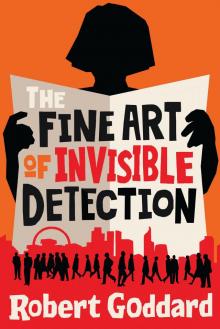 The Fine Art of Invisible Detection
The Fine Art of Invisible Detection One False Move
One False Move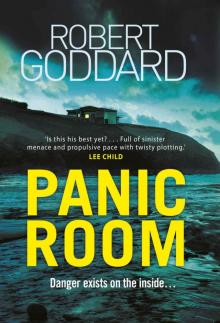 Panic Room
Panic Room Beyond Recall
Beyond Recall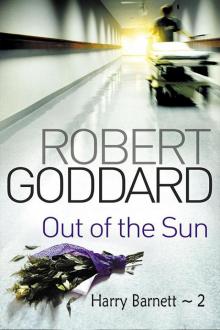 Out of the Sun
Out of the Sun In Pale Battalions - Retail
In Pale Battalions - Retail Painting The Darkness - Retail
Painting The Darkness - Retail The Corners of the Globe
The Corners of the Globe Name To a Face
Name To a Face Closed Circle
Closed Circle Caught In the Light
Caught In the Light Into the Blue
Into the Blue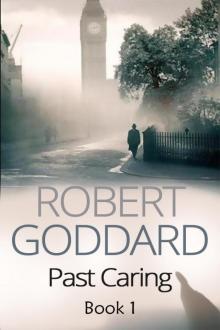 Past Caring - Retail
Past Caring - Retail Past Caring
Past Caring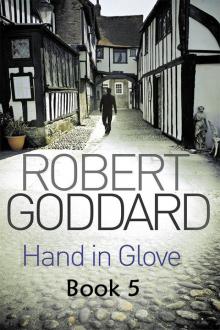 Hand In Glove - Retail
Hand In Glove - Retail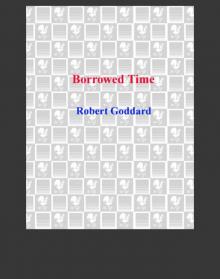 Borrowed Time
Borrowed Time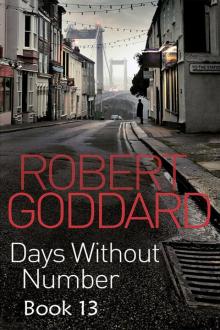 Days Without Number
Days Without Number James Maxted 03 The Ends of the Earth
James Maxted 03 The Ends of the Earth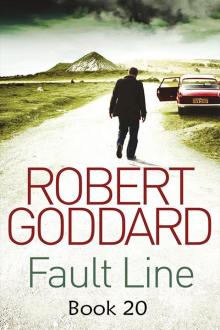 Fault Line - Retail
Fault Line - Retail Play to the End
Play to the End Sea Change
Sea Change Never Go Back
Never Go Back Take No Farewell - Retail
Take No Farewell - Retail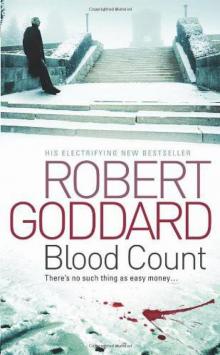 Blood Count
Blood Count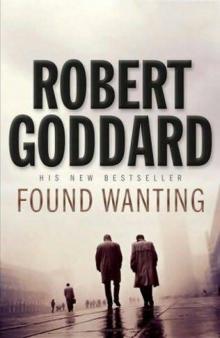 Found Wanting
Found Wanting Sight Unseen
Sight Unseen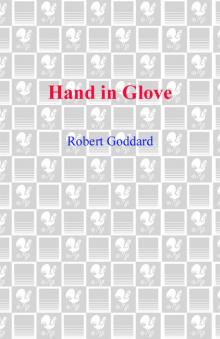 Hand in Glove
Hand in Glove The Ways of the World
The Ways of the World